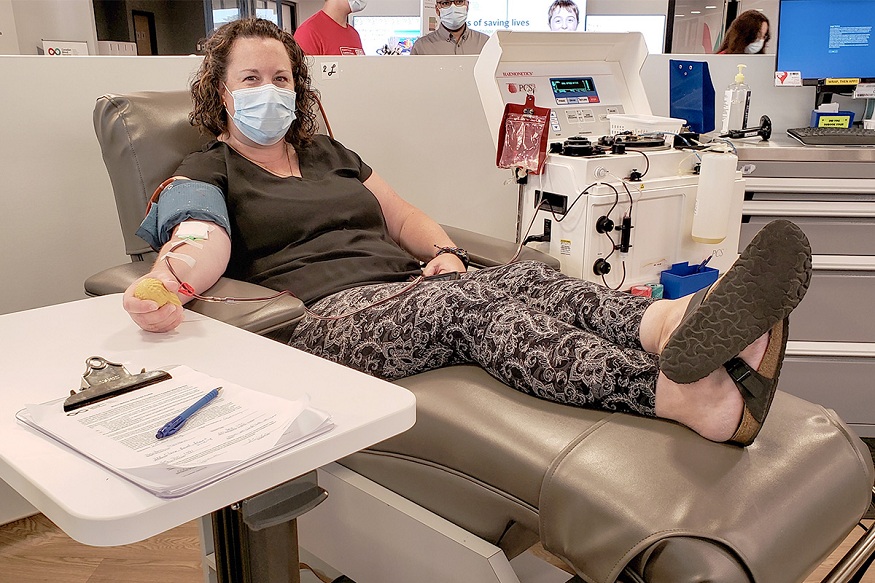As you consider embarking on the journey of plasma donation, it’s crucial to grasp the significance of your role in helping others. However, before you proceed, there are essential steps you must take to ensure your safety and the effectiveness of your contribution. By following the guidelines meticulously and understanding the process thoroughly, you can make a lasting impact. But what are some key factors you should keep in mind to guarantee a safe and successful plasma donation experience?
Benefits of Plasma Donation
When it comes to giving plasma, you aren’t only making a difference in someone else’s life, but you’re also benefiting yourself. Plasma donation in Glassboro, NJ offers both plasma donor perks and health benefits. Let’s delve into how donating plasma can be advantageous for you.
Plasma donor perks include incentives like compensation for your time and effort. Many donation centers offer monetary compensation, gift cards, or other rewards as a token of appreciation for your donation. Additionally, some centers provide loyalty programs, where frequent donors can earn bonuses or participate in exclusive promotions. These perks not only acknowledge your contribution but also make the donation experience more rewarding for you.
On the health front, donating plasma can have several benefits for your well-being. One significant advantage is the regular health check-ups you receive as a donor. These check-ups often include tests for blood pressure, iron levels, and other vital health indicators. By monitoring these metrics regularly, you can stay informed about your health status and take proactive measures if any issues arise.
Moreover, donating plasma may help reduce the risk of certain illnesses by promoting the renewal of fresh plasma in your body.
Eligibility Criteria
Considering your interest in the benefits of plasma donation, understanding the eligibility criteria is fundamental before you decide to donate. Donor screening is a crucial step to ensure the safety of both the donor and the recipient of the plasma. Before donating, you’ll undergo a thorough screening process to assess your eligibility. This includes providing detailed information about your medical history, current health status, and lifestyle habits.
During donor screening, medical history plays a significant role in determining if you meet the eligibility criteria for plasma donation.
You’ll be asked about:
- Any pre-existing medical conditions
- Medications you’re currently taking
- Past surgeries
- Vaccinations
- Any history of infectious diseases
It’s essential to disclose all relevant information truthfully to ensure the safety of the donation process and the eventual recipients of the plasma.
Preparation Before Donation
To prepare for your upcoming plasma donation, it’s essential to follow certain guidelines to ensure a safe and successful donation experience. Start by focusing on your dietary requirements.
Prior to donation, it’s important to consume a meal high in protein and iron, such as lean meats, beans, spinach, or fortified cereals. Avoid fatty foods, as they can affect the quality of your plasma. Additionally, steer clear of caffeine and alcohol on the day of your donation, as they can lead to dehydration.
Hydration is key for a smooth donation process.
In the days leading up to your appointment, drink plenty of water to ensure you’re well-hydrated. On the day of your donation, continue to drink water before and after the procedure. Staying hydrated not only helps maintain your plasma volume but also reduces the chances of feeling lightheaded or dizzy during and after donation.
Plasma Donation Process
Once you arrive at the plasma donation center, a staff member will greet you and guide you through the plasma donation process. The first step in the donation procedure is the medical screening. During this stage, you’ll be asked to provide personal information, such as your medical history and current health status. This is crucial to ensure that you’re eligible to donate plasma safely.
After the medical screening, you’ll proceed to the donation area. A trained healthcare professional will clean your arm and insert a sterile needle to draw blood. The blood will then pass through a machine that separates the plasma from other components.
The plasma is collected, and the remaining blood components are returned to your body. This process may take around 1-2 hours, depending on the amount of plasma being collected.
Once the donation is complete, you’ll be provided with refreshments to help replenish your fluids and snacks to boost your energy levels. It’s important to rest for a few minutes before leaving the donation center to ensure you’re feeling well. Following these steps ensures a safe and effective plasma donation experience.
Potential Risks and Side Effects
When donating plasma, it’s essential to be aware of the potential risks and side effects that may occur during or after the donation process. Proper risk management is crucial to ensure a safe donation experience. While donating plasma is generally safe, there are some potential side effects to be mindful of.
To aid in risk management, it’s important to follow all pre-donation guidelines provided by the donation center. These guidelines often include staying well-hydrated, eating a balanced meal before donation, and getting adequate rest. By following these recommendations, you can help minimize the risks associated with plasma donation.
During the donation process, some individuals may experience mild side effects such as lightheadedness, nausea, or fainting. These side effects can typically be managed by informing the staff immediately so they can assist you promptly. Side effect prevention techniques may include ensuring proper hydration, maintaining a comfortable body position during donation, and communicating any feelings of discomfort.
After donation, it’s common to feel a bit fatigued. This is usually temporary and can be alleviated by resting and replenishing lost fluids. If you experience any severe or persistent side effects post-donation, it’s important to contact the donation center or seek medical attention promptly. By being aware of potential risks and employing side effect prevention strategies, you can contribute to a safer and more effective plasma donation experience.
Post-Donation Recovery Tips
Following your plasma donation, proper post-donation recovery is essential to help your body replenish fluids and restore vitality. To ensure a smooth recovery, consider the following recovery strategies.
Firstly, the importance of hydration can’t be emphasized enough. Drink plenty of water post-donation to replace the fluids lost during the plasma donation process. Staying hydrated aids in preventing dizziness, lightheadedness, and fatigue. Aim to drink at least eight glasses of water throughout the day to support your body in recovering efficiently.
In addition to hydration, it’s recommended to consume nutritious snacks or meals after your donation. Opt for snacks that are rich in protein and vitamins to help your body regain strength. Some examples include nuts, yogurt, fruits, and whole grains. These foods provide essential nutrients that contribute to your overall well-being and aid in the recovery process.
Rest is another crucial aspect of post-donation recovery. Allow your body time to recuperate by getting adequate sleep and avoiding strenuous activities immediately after donating plasma. Listen to your body’s signals and take breaks as needed to avoid overexertion.
Frequency of Donations
To maintain optimal health and ensure your well-being, it’s important to consider the frequency of plasma donations. Donor requirements play a crucial role in determining how often you can safely donate plasma. Typically, donors must meet specific criteria such as age, weight, and overall health status to be eligible for donation. It’s essential to adhere to these guidelines to protect your health and well-being.
Donation intervals are another critical aspect to consider when determining the frequency of your plasma donations. Donation centers often have specific guidelines regarding how frequently you can donate based on your individual health and well-being. These intervals are put in place to prevent any negative impacts on your health and to ensure that your body has enough time to replenish the plasma that was donated.
It is recommended to follow the donation intervals provided by the donation center or healthcare provider. Over-donating can lead to fatigue, dizziness, and other health issues. By sticking to the recommended donation frequency, you can continue to contribute to those in need while safeguarding your own health. Remember, your well-being is paramount, so always prioritize following the guidelines set forth by the donation center.
Plasma Donation Centers
Considering the importance of donor requirements and donation intervals for maintaining your well-being during plasma donations, it’s also crucial to understand the role that plasma donation centers play in ensuring a safe and efficient donation process. Plasma donation centers are the designated locations where donors can go to contribute to this life-saving cause. These centers are equipped with trained staff who oversee the donation process, ensuring donors have a positive experience while adhering to strict donation requirements.
Donation centers play a critical role in maintaining donor safety by providing a clean and controlled environment for the donation process. They also ensure that donors meet all necessary eligibility criteria before proceeding with donations. Additionally, these centers offer donor incentives such as compensation for their time, which can vary based on location and donation frequency.
When visiting a plasma donation center, donors can expect a streamlined process from check-in to post-donation care. The staff at these centers are knowledgeable and dedicated to making the donor experience as comfortable as possible.
Impact of Plasma Donation
A single plasma donation has the potential to impact multiple lives, making a significant difference in the healthcare industry. When you donate plasma, not only are you contributing to life-saving treatments for patients in need, but you’re also benefiting from the process. Donor satisfaction is often high as individuals feel a sense of fulfillment knowing they’re helping others.
Apart from the emotional rewards, there are also health benefits associated with plasma donation. Donating plasma can help lower the risk of cardiovascular disease by reducing the levels of cholesterol in your blood.
It can also aid in the regulation of iron levels, which is important for overall health and well-being. Additionally, some donors report feeling a sense of rejuvenation after donating plasma, attributed to the body’s ability to regenerate the plasma proteins that were given.
Ensuring Donation Safety
For a safe and successful plasma donation experience, prioritizing your well-being and following recommended guidelines is crucial. Donor screening is a fundamental aspect of ensuring donation safety. Before each donation, you’ll undergo a thorough screening process to assess your eligibility. This screening helps to identify any health issues that may prevent you from donating plasma and ensures the safety of both you as the donor and the recipients who’ll receive the plasma products.
In addition to donor screening, maintaining proper hygiene practices is essential for donation safety. It’s important to wash your hands thoroughly before and after the donation process to minimize the risk of infection.
Keeping the donation area clean and following the guidelines provided by the donation center regarding hygiene protocols will help prevent any potential complications.
Conclusion
Now that you understand the benefits, eligibility, and safety measures of plasma donation, you can confidently make a difference in saving lives and improving health. By preparing properly, following the donation process diligently, and prioritizing your well-being, you can ensure a safe and effective donation experience. Remember, your contribution matters and can have a significant impact on those in need. Thank you for your generosity and commitment to helping others through plasma donation.



